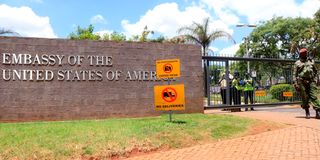
The US Embassy in Nairobi.
On March 18, the US Embassy in Nairobi issued a travel advisory, warning Americans of potential unrest and insecurity in Kenya.
The notice painted a picture of a country teetering on the edge of chaos. It was the sixth travel alert issued by Western embassies in Kenya this year, the last being by the UK in late June.
Here’s the twist. According to the newly released 2025 Global Peace Index, Kenya is more peaceful than the US. The report ranks Kenya 127th out of 163 countries. The US is at 128th.
Kenya performs better than the US largely because it has lower rates of violent crime and fewer civilian-held guns, even though it still faces challenges like cattle rustling, banditry and political protests.
The US struggles with far more lethal problems. It has a high murder rate of 6.5 per 100,000 people. It also suffers from mass shootings, a hyper-partisan political climate and an entrenched gun culture. In 2024, the US recorded 648 mass shootings, defined as incidents in which four or more people are shot. These shootings resulted in 703 deaths and 1,842 injuries. The number of homicides in the US in 2024 stood at approximately 16,700, a national average of five murders per 100,000 people.
Kenya recorded 1,947 murders in 2023, translating to 3.8 per 100,000.
It’s not just Kenya that outpaces the US in peace rankings. Tanzania ranks 59th, Rwanda is 80th and Uganda sits at 102nd.
Police killings
Thirteen countries in Africa are ranked more peaceful than the US. Mauritius leads at 22nd, Botswana at 29th, Sierra Leone (44th), Ghana (51st), Senegal (54th), Madagascar (60th), Namibia (65th), Zambia (68th), The Gambia (70th), Malawi (73rd) and Liberia at 92nd. These countries demonstrate that peace is not the preserve of the rich world.
America’s poor performance is linked to its ballooning prison population, widespread gun ownership and frequent police killings. A similar blind spot played out in 2023 when the UK’s Supreme Court ruled that Rwanda was not safe for asylum seekers. The decision effectively blocked a government plan to deport migrants to Kigali. Yet, Rwanda’s streets are demonstrably safer than London’s.
According to police, London recorded 14,626 violent crimes in 2023, including 1,009 murders and 4,876 robberies. Kigali, reported 421 violent crimes, with 83 murders and 338 robberies. Rwanda’s national murder rate was 2.3 per 100,000 – significantly lower than the UK’s 3.1.
In terms of democratic governance, Botswana, Mauritius and Namibia are ahead of the US and UK in the 2024 Democracy Index. Several US states are aggressively rolling back voting rights, undermining the credibility of their elections.
Press freedom? Again, Africa has the upper hand in several places. In the 2025 World Press Freedom Index released by Reporters Without Borders, Namibia is ranked 22nd, South Africa 25th, Mauritius 31st, Ghana 50th and Botswana 51st. The US is 55th.
Africa’s numbers are even more impressive in gender representation. Rwanda leads the world, with women holding 61 per cent of seats in parliament. The US trails at 27 per cent while the UK has 34 per cent. South Africa, Namibia and Mozambique also have high proportions of female lawmakers. Cabinet composition shows a similar trend: women make up 52 per cent of Rwanda’s Cabinet, 48 per cent in South Africa and 43 per cent in Senegal. In contrast, women hold just 26 per cent of Cabinet roles in the US and 30 in the UK.
Paid maternity leave
Africa’s family policies are also generous. Rwanda grants 12 weeks of fully paid maternity leave and two weeks of paternity leave. Mothers in South Africa receive 17 weeks of maternity leave, and fathers get 10 days. The US remains the only developed country that does not guarantee paid maternity leave. It offers 12 weeks of unpaid leave and nothing for fathers.
So why does the world still view Africa through the lens of dysfunction? Part of it is historical. The colonial imagination painted Africa as backward. These myths still shape perceptions. The huge global wealth and power imbalance also encourages the assumption that rich is better.
Some Africans, still burdened by a legacy of inferiority, hesitate to champion their successes. Their leaders seek external validation, often treating Western praise as more legitimate than the approval of their citizens. They will sign the same peace agreement if it’s brokered by Europe or Washington, but hesitate if it comes from Addis Ababa or Lagos.
As a result, Africa’s steady progress often gets lost in silence – even when numbers are on its side. Global institutions, designed by richer nations, apply standards that often fail to capture African realities.
The facts are clear. The data is strong. It’s time to stop lecturing Africa and start listening.
The author is a journalist, writer, and curator of the "Wall of Great Africans". X@cobbo3









